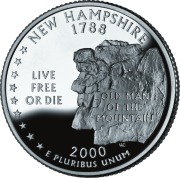Charlie Arlinghaus
December 28, 2011
As originally published in the New Hampshire Union Leader
As with any major event in America, much of the mythology of the New Hampshire primary either isn’t true or is only half true. Boosters of the primary, like most boosters, tell a tale full of legend and less than critical promotion of the home team.
Like anyone else who lives in New Hampshire, I am naturally fond of the New Hampshire primary. Nonetheless, I think some of the claims about the primary process are exaggerated. Perhaps no claim is quite as misleading as the insult “Iowa picks corn, New Hampshire picks presidents.”
On its face, this claim is false. The last two presidents both won the Iowa caucus and lost the New Hampshire primary. But buried inside this claim is another more general falsehood. New Hampshire boosters will tell you that the New Hampshire primary stands on its own and we don’t generally care what happens in Iowa. It has little or no impact on the New Hampshire primary.
This claim too is just plain wrong. While it has been true that John McCain has been able to skip Iowa and still do well in New Hampshire, the Iowa results have been influential for most other candidates. As early as 1980, George Bush was able to use an upset victory in Iowa to consolidate a position as the chief moderate alternative to Ronald Reagan.
Since then, Iowa has changed our feelings about potential candidates. Phil Gramm’s 1996 candidacy ended after a fifth-place Iowa finish. It was seen as impossible to overcome that low a finish and remain competitive. In the same election, Lamar Alexander used a stronger than expected third place finish to catapult him into contention in New Hampshire.
Of course the publicity of an Iowa finish isn’t everything. Alexander and Gramm both had remarkably strong New Hampshire operations. For one candidate, it wasn’t enough to overcome a poor finish. For the other it allowed him a chance to turn unexpected good news into contention. Four years ago, Mike Huckabee had a much weaker operation in New Hampshire leaving him only able to translate a big Iowa win into a distant third place finish.
Primaries in America are a sequential process. One happens after another and not in a vacuum. The Iowa caucus results will see the equivalent of a few billion dollars worth of publicity and be watched by millions more people than any early debate. The New Hampshire primary adds a few more billions of dollars in publicity dwarfing the amount a campaign can spend itself. Whoever wins Iowa and whoever does better than people expected him to do will receive a boost in New Hampshire. Iowa will narrow the field just as New Hampshire narrows it further.
The transfer isn’t perfect because each state is different. New Hampshire and Iowa have very different Republican electorates. In 2008, 88% of Iowa GOP caucus-goers described themselves as conservative, the most conservative of any primary electorate. In New Hampshire, only 55% self-identified as conservative – among the lowest of any state. In addition, while 60% of Iowa GOP voters described themselves as evangelical, only 23% did in New Hampshire – a state which unfortunately has the lowest church attendance in the nation.
Another myth is the notion that we like to meet the candidate: “I don’t know if I like him, I’ve only met him three times.” In reality, a significant majority of the voters will never go to see a candidate in person and almost none will go see all the candidates. Most voters want to know they could have seen every candidate but on a typical evening or weekend, we’re tired from work or have other family priorities which come ahead of a candidate rally.
That’s not to say that grass roots campaigning doesn’t matter. Voters check the newspapers and television. As an aside, as much as we’re told that newspapers are struggling, there is a significant overlap between newspaper subscription lists and primary voters. Voters checking the coverage in the paper and watching television want a campaign that has the appearance of a grass roots campaign regardless of how many town chairmen and county captains it may have. It’s one reason every candidate calls every appearance it can get away with a “town hall meeting.”
I don’t mean to imply that campaigns are just a Potemkin village eagerly awaiting the results in Iowa. Grass roots can make a difference but they’re like sweeping in curling. It looks impressive with a lot of motion and activity. The sweeping can change things at the margins but only so much. The rock has to be on a good trajectory to begin with.
The New Hampshire primary is an important and valuable process in concert with other states. But the racing form will look very different a week from today after actual voters render judgment on more than just corn.

